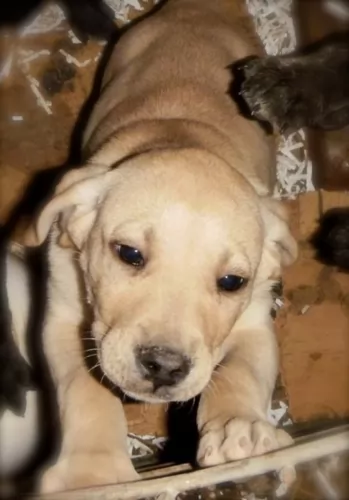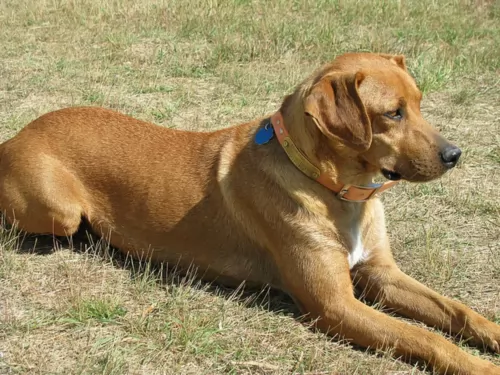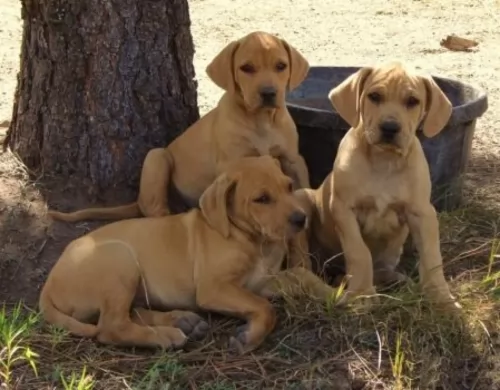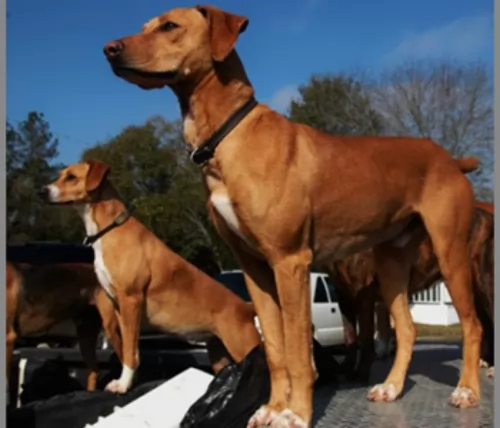 Petzlover
PetzloverMountain View Cur is originated from United States but Pugnaces Britanniae is originated from United Kingdom. Mountain View Cur may grow 9 cm / 3 inches shorter than Pugnaces Britanniae. Mountain View Cur may weigh 81 kg / 178 pounds lesser than Pugnaces Britanniae. Both Mountain View Cur and Pugnaces Britanniae has almost same life span. Mountain View Cur may have less litter size than Pugnaces Britanniae. Both Mountain View Cur and Pugnaces Britanniae requires Low Maintenance.
 The Mountain View Cur is an American bred dog that resulted from years of deliberate breeding and careful culling of the litters to improve the Mountain Cur into a hunting dog with a better temperament and a stronger hunting instinct. Because of these generations of culling and refining the Mountain View Cur is so uniform within the breed that it is considered a thoroughbred as well as a purebred. Developed at the end of the 1980’s by Michael and Marie Bloodgood. The foundation for their breeding program was the Mountain Cur.
The Mountain View Cur is an American bred dog that resulted from years of deliberate breeding and careful culling of the litters to improve the Mountain Cur into a hunting dog with a better temperament and a stronger hunting instinct. Because of these generations of culling and refining the Mountain View Cur is so uniform within the breed that it is considered a thoroughbred as well as a purebred. Developed at the end of the 1980’s by Michael and Marie Bloodgood. The foundation for their breeding program was the Mountain Cur.
The new Mountain View Cur were meant to be stronger in every way than the original Mountain Cur. They could track, hunt and tree both large and small prey. It’s work ethic is unsurpassed regardless of the weather or terrain. Highly intelligent and motivated the Mount View Cur can use its incredible prey drive to follow the game at any cost. Yet it can be trusted off lease because while hunting the Mountain View Cur will instinctively go to the hunter and check in occasionally.
This breed is ultimate hunter, known for treeing squirrels and racoons. His strongest drive is to please the human he is with. He has a gentle, loving temperament. Because of their desire to please, they are great companion animals as well as hunters. In addition to coons and squirrels, the Mountain View Cur could hunt possum, coyote, pheasants, turkey, hare, grouse, hare and rabbits. They are also willing to fight with lions, bobcats, bears, and wild boars. Surprisingly they can herd as well.
They are a healthy breed and very hearty with a long lifespan. They are extremely popular in the mountains and hills of Appalachia, but they are rare and almost unknown outside the United States. Puppies are very expensive and there is a waiting list that could be very long. The original Mountain View Curs descended from just two Mountain Curs – one male, one female. As the program went on Mountain View Curs were bred to Mountain Views Curs and then other Mountain Curs were added in.
Originally the breed was registered as a part of the Kemmer Stock Breeders Association Registry. Eventually however the breeders of View Curs came to believe that they had an entirely new breed and the American Squirrel and Night Hunters Association was the choice to register the breed in 1995. One year later the Mountain View Cur Registry was founded.
Pugnaces Britanniae is a dog which is now extinct. There isn't certainty surrounding the origins of the dog but it is thought they descended from dogs brought to Britain way back in the 6th century BC already.
These are ancient dogs, and when you do research you find references dating back to centuries ago. In fact when you read of the Roman conquest of Britain you read of huge dogs, which the Romans referred to as Pugnaces Britanniae.
It is believed that the English Mastiff descended from the ancient Alaunt and Pugnaces Britanniae and that the dog was used as a war dog.
 The Mountain View Cur is a rugged, healthy breed that has very little in common with its ancestor the Mountain Cur at least in its looks. The Mountain View Cur is born with no dewclaws while the Mountain Cur has them. The Mountain View Cur is a stronger and more muscular breed as well. They have a flat domed head with ears that are high set and short. Her eyes are dark and prominent, its neck and back strong and muscular, while its chest is deep. Half the pups are born with a bobtail and half have their tales docked. About 10% are black, brindle or brindle and black. They all have white on the feet, chest and muzzle.
The Mountain View Cur is a rugged, healthy breed that has very little in common with its ancestor the Mountain Cur at least in its looks. The Mountain View Cur is born with no dewclaws while the Mountain Cur has them. The Mountain View Cur is a stronger and more muscular breed as well. They have a flat domed head with ears that are high set and short. Her eyes are dark and prominent, its neck and back strong and muscular, while its chest is deep. Half the pups are born with a bobtail and half have their tales docked. About 10% are black, brindle or brindle and black. They all have white on the feet, chest and muzzle.
The Pugnaces Britanniae was a huge dog standing at roughly 67 to 75cm and weighing 52 to 110kg.
He was a heavily built dog, a Mastiff type dog that had a large head, broad muzzle with fairly loose skin around the mouth, brown eyes, a broad back and rump, muscular legs and floppy ears with a long tail. In fact the Mastiff, thought to have descended from the ancient Alaunt and Pugnaces Britanniae, gives you an idea of what the dog looked like. He no doubt has a short, smooth coat available in fawn, tan or brindle and with the black mask.
The Pugnaces Britannia was a naturally aggressive dog so it is to be expected that he wouldn’t automatically have been a good family dog, possibly being aggressive around children and other dogs. They were intelligent and were no doubt taught some simple commands.
They were also very territorial dogs, wanting to instinctively chase and attack unknown people and animals. They were strong minded, confident, loyal ad loving dogs towards their owners, being protective of them, wanting to please them.
 Very child friendly, playful and gentle
Very child friendly, playful and gentle
Scent and well-disciplined self-control
This breed is designed to work and to hunt. They are happiest when they have a job or are in the woods with you. They have excess energy and need space. They will not do well as a 24 hour inside dogs. They need space to run and hunt.
Highly intelligent, excellent ability to learn whatever you want to teach them.
The Pugnaces Britanniae may well have been a large dog and quite imposing to look at but he was in all likelihood a good-natured pet who got on well with his family members, being loyal and loving if brought up correctly.
Long ago dog training and socialization didn’t exist but a large dog like this would have to be socialized and trained to become obedient and an amicable all-rounder.
 The Mountain View Cur is a very healthy breed without a lot of genetic issues due to the purity and isolation of the breed. No genetic deformities or illness. They are susceptible to a few health concerns.
The Mountain View Cur is a very healthy breed without a lot of genetic issues due to the purity and isolation of the breed. No genetic deformities or illness. They are susceptible to a few health concerns.
Bloat – like most larger dogs, the Mountain View Cur is susceptible to bloat. This occurs when the dog’s internal organs, stomach and intestines become inverted and twisted. This can occur when the dog eats a large meal immediately before or after strenuous exercise.
The Pugnaces Britanniae could live to 10, 11 or 12 years of age with good care. Large Mastiff type dogs like this would have had to watch out for common canine diseases such as hip dysplasia, cancer and bloat.
In those days, no screening tests were available for health problems like this. Gastric dilatation volvulus or bloat is a common health issue with large, deep chested dogs where the stomach fills with gas and the stomach twists. Its a life threatening disease.
Canine heart disease is another serious health issue with these mastiff type dogs. Early stages with heart disease show there may well be no symptoms at all. However, as the heart disease progresses towards congestive heart failure, the dog will have symptoms such as fatigue, difficulty with breathing, weight loss, a distended abdomen and coughing.
A dog with symptoms like this would have to see a vet immediately.
 The Mountain View Cur puppy after 12 weeks of age will need to eat 3 meals per day until they are 6 months old. From 6 months to one year they need 2 meals a day. They need high quality dry dog food made especially for puppies that will become large dogs.
The Mountain View Cur puppy after 12 weeks of age will need to eat 3 meals per day until they are 6 months old. From 6 months to one year they need 2 meals a day. They need high quality dry dog food made especially for puppies that will become large dogs.
An adult Mountain View Cur can eat only once a day and be healthy. They need a high quality dry food for large dogs.
Extremely healthy breed with stamina and speed.
The Mountain View Cur is a hunter and an extremely active one at that. They also have herding tendencies. Though they are not hyper, they need a lot of exercise. They also need a job. They want nothing more than to please their person, but they need a job to stimulate both his body and mind. He needs daily walks and a fenced yard to run in. They are good at agility, search and rescue, herding, field trials, police work, and hunting.
The diets of ancient dogs were different to what they are today, as in those days there were no commercially manufactured dog foods. Dog owners in all likelihood tossed scraps to them which included starch.
Today a large dog such as the extinct Pugnaces Britannia would have no doubt been fed a high quality kibble from a leading brand and packed with minerals and vitamins specially formulated for a large dog breed.
Homemade food is also important, but not any kind of food – it has to be food which doesn’t upset the dog’s digestive system. Simple but nutritious food such as boiled chicken, brown rice or pasta, sweet potatoes, carrots and spinach is ideal for a dog, and when it is chopped up can be added twice a week to the dry kibble for a tasty, healthy treat.
Raw meat added in occasionally is also hugely beneficial. No dog should ever be without fresh, cool water constantly available.
As a short haired dog, the Pugnaces Britanniae would have required a brushing twice a week to rid the dog of loose hairs. Maybe in those days they didn’t check their dogs over to see that all was well, but today you would need to check the inside of the ears. If the insides were red, it could be a sign of an ear infection brought on by dampness, excess wax and dirt.
The eyes would need to be checked for discharge and the teeth checked a well. One rotten tooth can cause a lot of havoc. The nails of the dog would have had to be checked and clipped as well.
As a war dog, the Pugnaces Britanniae would have been fit. He is a big dog and while they require exercise such as walks and hide-and-seek type of games, he isn’t the kind of dog that would go running with you on a jog, as large, heavy dogs can overheat easily.